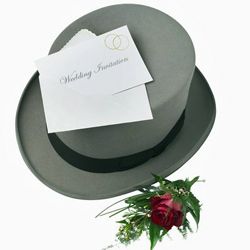“
 “Your wedding invitation can set the tone for the whole wedding.Stockbyte/Getty Images
“Your wedding invitation can set the tone for the whole wedding.Stockbyte/Getty Images
Calligraphy is an ancient handwritten art form that maintains a firm foothold in the world of weddings. With a renewed appreciation for craftsmanship coming in vogue, mass-produced is out and artisan is in. Purists and aesthetes will offer many reasons for choosing handwritten over machine-printed. Here are some whys and why-nots for deciding if you should use a calligrapher for your wedding invitations.
Pros
Calligraphy is typically found on the invitation envelopes for formal weddings, and when it arrives in the mail, it makes a statement. Something usually along the lines of, "we have spared no expense to make this wedding spectacular." Calligraphy on your wedding invites says classic and traditional. Much prose has been written about the importance of the written word and handwriting being a lost art. So, if you fall into this camp, you understand that what makes calligraphy so special is that each piece is an original because it’s done by hand and has imperfections. There are calligraphers whose script is so artful and their handwriting has such a special and unique quality that it would be next to impossible to achieve on a computer. If this represents the spirit of your wedding, then calligraphy may just be the way to go.
Cons
There are also a couple of good reasons to find a printing alternative to calligraphy, and budget is the biggest one. Most calligraphers charge per piece, though occasionally one may charge by the hour. A skilled calligrapher may charge anywhere from $2 to $10 per piece, and this can add up quickly depending on the number of people invited. Time is another reason. If you’re pulling your invitations together closer to your wedding, you may not have time to put a calligrapher to work, especially if you’re getting hitched during high wedding season. Calligraphers can only work so fast, so lead times can range from 2 weeks to 2 months. Not all calligraphers do the same style of work, so if you have a particular font or lettering style in mind, it could take some legwork to find the right person to do it. And lastly, handwritten invitations open up the possibility of mistakes, so you’ll need to supply the calligrapher with additional blanks. Plus, you’ll want to check their work upon receiving the completed project.
Calligraphy Alternatives
Even if you’re planning a formal fete, there are alternatives to calligraphy. There are many script and handwritten fonts available that you can print from computers. Most printers have the capability of feeding envelopes through, so you can print directly onto the envelope. And as a last resort, most of us have at least one artsy friend with cool handwriting, so you can always see if he or she will help you out.
Did You Know?
The Copperplate font is the most challenging for a calligrapher, so it usually costs the most.
Lots More Information
Related Articles
- 10 Picture-Perfect Wedding Poses and Candids
- 10 Questions to Ask Your Wedding Planner
- 10 Biggest Wedding Expenses
- 10 Great Wedding Themes
- 10 Classic Engagement Ring Styles
- 10 Classy Wedding Shower Ideas
- 5 Makeup Tips for Every Wedding
Sources:
- "How to Hire a Calligrapher for Your Wedding Invitations?" myexpression.com, 2010.http://www.myexpression.com/ArticlesWedding/HiringCalligraphers.cfm
- "Wedding Calligraphy: The Basics." Theknot.com, 2010.http://wedding.theknot.com/wedding-planning/wedding-invitations/articles/wedding-calligraphy-basics.aspx?MsdVisit=1
- "Will You Address Your Wedding Invitations or Hire a Calligrapher?" glamour.com, 2010. http://www.glamour.com/weddings/blogs/save-the-date/2010/03/will-you-address-your-wedding.html


